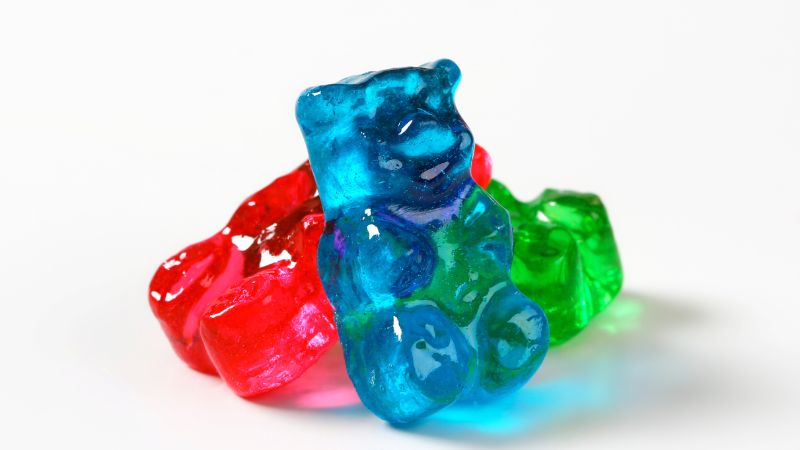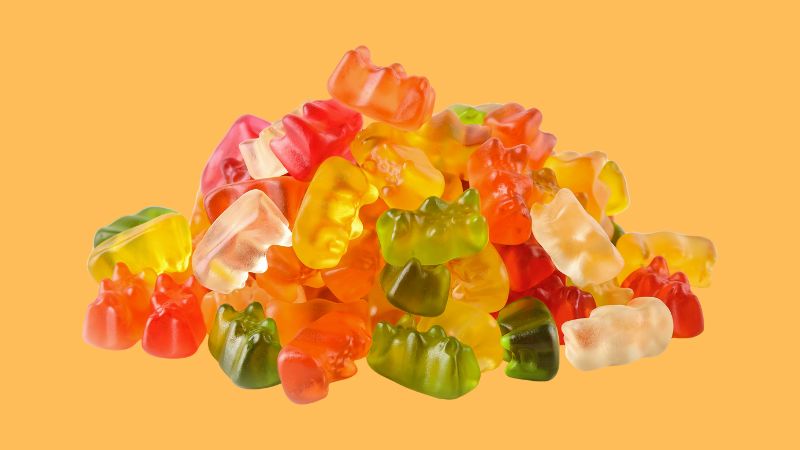
Stop if you’re considering giving your dog gummy bears or other gum treats. For humans, gummies are tasty treats, but they’re not for our four-legged friends! It is unsafe for dogs to consume these treats, and owners should not give them to their puppies.
Despite not being toxic, gummy bears contain a lot of sugar and can cause a tummy ache. Particularly when consumed in significant amounts. It’s only the tip of the iceberg.
Today, many sweets, such as gummy bears, come with sugar-free formulas. Xylitol, an artificial sweetener, may be used in these formulas, which are extremely toxic to dogs.
Chocolate is less toxic than xylitol, but even small amounts can be harmful. The amount can even be fatal for a dog if it is large enough.
Is it bad for dogs to eat gummy bears?
Dogs can get tummy aches after chewing gum bear candy.
Gummy bears in their typical form
Candy gummy bears are traditionally made without artificial sweeteners. Despite being full of sugar and having no nutritional value, they are not directly poisonous or toxic.
If a large dog eats one or two bears, it is unlikely that he will suffer significant adverse effects.
If ingested in large quantities, small dogs and puppies may experience stomach flu, vomiting, and diarrhoea.
The result is that they should be avoided.
Moreover, some dogs eat candy that comes in plastic packaging. In addition to being a choking hazard, plastic can also block the intestine (intestinal obstruction). Dogs that eat plastic should be taken to a veterinarian immediately.
Unsweetened gum bears (Xylitol Toxicity)
This is where the greatest danger lies. Gummies should never be given to dogs for the same reason.
The risk of them containing xylitol is not worth it. Xylitol is used in various human products to reduce their calorie and plaque content.
Gummy bears, jujubes, mints, chewable vitamin gummies, protein bars, peanut butter, mouthwash, toothpaste, and medications.
A mix of sheep and Poodles
Xylitol has two main toxic effects on dogs. As a result, severe hypoglycemia and direct liver damage can occur, both of which can be fatal.
In case your dog has eaten xylitol, contact your veterinarian right away.
Artificial sweeteners are also used in gummy bears and gummies.
Dogs are not at risk from these, but you may remember reviews of sugar-free Haribo gummy bears – larger quantities can cause gastrointestinal distress and diarrhoea.
Gummy Bears with THC Or ‘Edibles’
Medical and recreational marijuana use is rising (Cannabis sativa/Cannabis indica). Pet poisonings have also increased significantly in recent years, says the Pet Poison Helpline.
What should I do if my dog ate gummy bears?
While gummy bears are generally safe for your dog, you should still watch for signs of discomfort.
Did your canine companion eat some gummies? You may need to act quickly according to your dog’s size, the type of gum consumed, and the ingredients listed.
Step 1: Check Your Dog
Make sure your dog is examined closely. Is there any sign of illness or discomfort on their part? Did anyone vomit or have diarrhoea? Are they panting, walking, or excessively drooling? Is the room bright and comfortable?
Immediately contact the nearest emergency veterinarian if you notice any signs of distress, including collapse, seizures, or tremors. If your puppy ate gummies containing xylitol or marijuana, immediately contact your veterinarian.
Step 2: Clean The Area
Please remove any remaining gummy bears and their packaging. Don’t let your canine companion or other pets reach them. Ensure the trash can is safe for pets, or consider moving it out of reach.
Step 3: Detective Work
Before calling the vet, gather as much information as you can. Find out how many have been eaten. If part of the package is missing, you may have to estimate how much is missing.
Has your puppy eaten or chewed the packaging in the process? What time did they consume the gummies? Did they contain xylitol or an artificial sweetener?
Step 4: Call Your Vet
You should also give them information about your pet’s weight, breed, age, and whether he suffers from any diseases. If your dog has eaten only a few regular gummies, your veterinarian may advise you to monitor them at home. Watching for any signs of illness, such as vomiting or diarrhoea, would be best.
Your veterinarian will ask you to take your dog to the clinic for an examination and treatment if he is sick, eats the plastic packaging, or is suspected of ingesting xylitol. Take the packaging to the vet.
How Do the Main Risks Affect Me?
You should contact your veterinarian immediately if your dog has consumed gummies or gummy bears containing THC or xylitol.
Candy gummy bears without artificial sweeteners are unlikely to harm dogs if consumed in small amounts. You may not notice any adverse effects, especially if only one or two bears have been eaten.
Dogs that have eaten a large volume and small breed dogs and puppies are likelier to show signs of gastroenteritis (see below). Remember that if you have concerns about your pet’s health, it’s always best to speak to a veterinary professional.
- stomach flu
- Low blood sugar and liver damage
- Marijuana or THC toxicity
- Potential Intestinal Obstruction
What can happen to my dog if it gets sick?
There are a few potential things that could happen, including nothing.
In the case of dogs that have consumed regular pieces, no major veterinary intervention is usually necessary. As a result, your veterinarian may prescribe treatments for a tummy ache.
In the case of sugar-free gummies that contain xylitol, the situation is completely different. You should seek veterinary attention as soon as possible. Upon eating them, your veterinarian may induce vomiting if it is safe.
Your puppy may need blood testing, and intravenous glucose drips until the toxic effects pass. The antidote for xylitol toxicity is unknown.
The prognosis is poor when a dog develops liver necrosis or liver damage.
Frequently Asked Questions
Xylitol: How Much Is Toxic to Dogs?
According to studies, just 0.1g of xylitol per kilogram of body weight causes hypoglycemia in dogs. A few gummy bears can be enough to poison a small dog, depending on the brand, product, and flavour. Liver necrosis is most commonly reported when xylitol is consumed at higher doses than 0.5 grams per kg.
Is it okay for dogs to eat gummy bears?
Dogs can eat gummy bears if they don’t contain xylitol or THC. Taking care of your diabetic dog is also important, as sugar can destabilize him.
What should I do if my dog vomits?
The veterinarian may decide to make your dog vomit after eating gummy bears containing xylitol or THC too recently. However, it would be best if you didn’t try it at home.
In dogs with low blood glucose levels caused by xylitol toxicity, it can make them even sicker, and marijuana toxicity can put them at risk of choking. Therefore, an experienced veterinarian should decide to induce vomiting if necessary.
Final Thoughts
Gummy bears are unlikely to cause lasting damage to your dog. You’ll usually just be dealing with an upset stomach! Sugar-free versions can be deadly, however, if they contain xylitol. Keep all sweets away from pets and out of their reach. Children should always be closely supervised when eating near dogs.



Leave a Reply